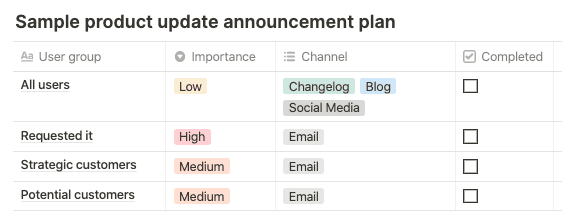How to announce new features and use product updates to drive growth

Product updates are core to building a SaaS company. They are an opportunity to show your customers that you are improving the product and listening to their feedback. When done right, they can be a great way to drive growth by upgrading existing customers, reducing churn or converting potential customers.
To make the most of your product update announcements, I recommend doing these three things
-
Changelog with all notable updates
-
General announcements for important updates
-
Personal updates to some specific customers
1. Changelog with all notable updates
For a SaaS company that is constantly improving the product, it's a good idea to keep a list of all your product updates where your customers and prospective customers see the progress you're making. This can be done by keeping a changelog on your site, which is basically a list of notable changes made to the product. Note that you don't need to, and probably shouldn't, include every single update, but instead focus on notable updates.
Another way to do this is to announce all your updates on your company blog. You could set up a separate section called "product updates" to make it easier for readers to browse.
2. General announcements for important updates
If you have made an update that is important for all your users to know about, you should announce it in more places than just your changelog. Here's a list of potential channels to use
-
Blog
-
Social media
-
In-app
-
Webinar
-
Email
Pick channels based on the importance of the update. If it's not critical, announcing it on your blog and social media might do the trick. If it's a critical update, you might want to use all channels: announce it on your blog and social media, have a pop-up in your app, send an email, and invite all your users to a webinar.
3. Personal updates to some specific customers
When you launch a new feature that a specific group of customers or users are interested in, send them a personal message to let them know. Most companies keep some type of changelog and make general announcements, but few send personal updates. This can be a great differentiator for you.
To do this well, start by figuring out who cares about the update and how important it is to them.
Who cares about your product update?
You will typically have a few groups of customers or users that care about a new feature or update. These groups could be
-
Customers that have requested it specifically
-
Especially important users or strategic customers
-
Potential customers that you want to convince to sign up
-
Stakeholders that are generally interested in your updates
Start by figuring out who these groups are for your company and product.
How important or critical is the update to them?
For each group of customers that will care about your product update, ask yourself how important the update is to them. Don't confuse how important a new feature is to your customers with how much time you have spent on it. If an update is not really important, then you could batch the announcement with another coming update. You want to avoid spamming your customers with updates that they don't really care about.
What's the best channel to use?
Email is your go-to channel as you want these messages to be personal. If you want to automatically send personal emails when you launch a feature that a customer has requested specifically, you should use a tool like Convas. This is how our product update announcements work. Your customers will love these updates!
If you're close to your customers, you could also send a text or call them. Remember that you're sharing good news that are relevant to the person you are sharing it with.
Craft the message
Now that you have your plan, you need to write the message and send it out. A sample plan for announcing a new feature could look something like this.

Regardless of how you share your product update, make sure to focus your message on what the benefit is for the customers that will receive the update. This is a great opportunity to communicate directly with your customers. Show them that they are valued and seen by making the message about them.
Start the message by describing how this will make the product better for your customers. Avoid talking about how much time you have spent building the feature. Include a description of how the new feature works and how it can be accessed or used. Using product images or videos are great.
To sum up
When done right, product update announcements can be a great way to drive growth. You should keep a changelog and send general updates, but don't miss the opportunity to take your updates to the next level with personal updates. Imagine requesting a new feature and getting an email when that feature has been launched. Now that's a great customer experience!
If you want to send personal updates automatically when you launch something new, give Convas a try (we have a free plan to get you started).


